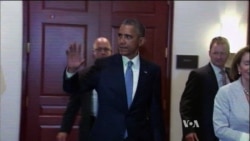President Barack Obama says the failure of the House of Representatives to pass a measure to help American workers affected by global trade pacts will “directly hurt about 100,000 workers and their communities.”
"For the sake of those workers, their families, and their communities, I urge those members of Congress who voted against Trade Adjustment Assistance (TAA) to reconsider and stand up for American workers," the president said Saturday in his weekly address.
The president’s ambitious Asia-Pacific free trade agenda was dealt a serious blow Friday when the House of Representatives voted against the part of the trade package that would have given aid to workers who lost their jobs as a result of U.S. trade deals.
Obama’s fellow Democrats, as well as Republicans, voted the measure down 302-126.
Even though lawmakers went on to narrowly approve so-called fast-track authority for Obama to negotiate the Trans-Pacific Partnership (TPP) deal, the overall vote is far from a victory for the president. Republican lawmakers say they will try to bring the workers aid portion up for a new vote Tuesday.
Many Democrats are concerned TPP would send more American jobs overseas and hurt the environment. The workers' aid piece was initially included to appease Democrats and Mr. Obama went to Capitol Hill Friday morning to make a last minute appeal to key Democratic legislators.
Even so, House Minority Leader Nancy Pelosi said she would oppose the legislation. Following the vote, she said in a statement that is time for both parties to negotiate a better deal for the American people."
"We look forward to working in a bipartisan way for a trade promotion authority bill that has better transparency, more consultation with Congress and stronger protections for congressional priorities — especially labor rights and the environment."
On the Republican side, House Speaker John Boehner, who supported the measure, said he was disappointed.
Watch related video of the president on Capitol Hill
"Republicans did our part, and we remain committed to free trade because it is critical to creating jobs and growing our economy," he said. "This is an opportunity for the Democratic Party to take stock and move forward in a constructive fashion on behalf of the American people.”
Most Republicans support free-trade agreements and therefore agreed with Obama, whom they oppose on most issues. But some tea party Republicans opposed giving the president more power to negotiate trade agreements, and were aligned with progressive Democrats on this issue.
A broad coalition of labor unions, environmentalists and others had pushed hard against the trade agenda for months, with some Democrats saying the president had failed to convince them.
Representative Brad Sherman of California said, “Well, obviously he thinks this trade deal will help the American economy and help working families. The vast majority of Democrats and 100 percent of all those organizations of working people disagree.”
Claude Barfield of the center-right, Washington-based American Enterprise Institute called the results damaging to Obama’s presidency.
“The president has made this his major goal for his second administration," Barfield said. "He’s actually gone all out in terms of lobbying for the bill — some things he has never done before.”
Baffling Trade Talks Explained
Trade Promotion Authority, or TPA, is supposed to give Congress a chance to give instructions to U.S. negotiators, who then work, often for years, to hammer out the best possible deal with other nations that trade with the United States. Under TPA, Congress retains the responsibility to approve or reject a signed deal, but cannot amend the agreement.
Trans Pacific Partnership, or TPP, is a proposed deal among 12 Pacific nations, including the United States. Trade officials say this agreement is nearing completion, but some difficult issues remain. Trade deal supporters say having TPA in place would make it easier to get a deal done between the United States and hard-bargaining trading partners.
Transatlantic Trade and Investment Partnership, or TTIP, is a proposed deal between the United States and the European Union. These talks are said to be at a relatively early stage.
Trade Adjustment Assistance, or TAA, is a program intended to help workers displaced by foreign trade get the training they need to find new jobs.
Analysts said the president's visit to the House just hours ahead of the vote was a risky and highly unusual gesture, but Barfield said the defeat was more than just a serious blow to the president: “It would be seen as a setback for the United States' ability to lead, certainly in Asia, and also later in Europe.”
At the daily White House briefing, press secretary Josh Earnest played down the defeat in Congress, calling it a temporary setback. He said the president would continue to aggressively lobby House Democrats, because he believes trade promotion authority is critical to forging TPP and other multinational trade agreements.
'Fast Track'
The fast track authority that was approved Friday would allow the White House to negotiate the 12-nation Asian trade pact and others like it while preventing Congress from making any changes in the deals when they come up for approval or rejection.
Refusal to grant the negotiating authority would make it much more difficult for the administration to secure the TPP deal, which is already years behind schedule.
The countries negotiating the TPP are the United States, Vietnam, Singapore, Peru, New Zealand, Mexico, Malaysia, Japan, Chile, Canada, Brunei, and Australia. The U.S.-led pact aims to cover nearly 40 percent of global economic output when completed.
The White House has said the TPP would help further break down global trade barriers, open untapped markets, and grow the economy, while providing an important counterbalance to the growing economic strength of China.












